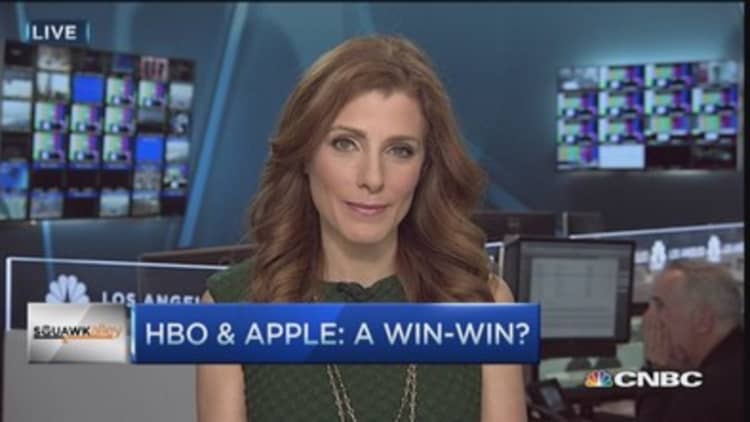
HBO Now, the new $15-per-month service, is momentous for Time Warner, as its first direct-to-consumer offering. It's also a key test for the entire cable industry: Will it create new revenue from Internet-only customers? Or will it prove such an appealing alternative to the traditional, pricy TV bundle, that it'll drive cord cutting?
HBO's exclusive distribution through Apple for the first three months is designed to be a win-win. HBO is looking to sell its new streaming service to the 10 million broadband-only households and the 70 million basic-cable customers who don't have HBO. With this exclusive deal HBO gets access to Apple's hundreds of millions of customers and its customer service systems (this is HBO's sold-directly-to consumers—outside the traditional TV bundle). And HBO should get a bigger chunk of the revenue from the monthly subscriptions than it does when it sells through a TV provider.
Apple will benefit from its cut from the subscription fees—it generally takes about 30 percent of the cost of apps it sells, and it should benefit from HBO's big promotional push—looking to get as many people as possible to sign on ahead of the April 12 launch of season five of "Game of Thrones." All that promotion could help it sell more Apple TVs, the streaming devices it just slashed the price on by $30 to $69.
Time Warner CEO Jeff Bewkes acknowledged the challenge, saying at Deutsche Bank's Media, Internet & Telecom Conference, "We both worry about change in distribution and we salivate over change in distribution." But he says net net, it's "going to bring more opportunity than a problem."
Morgan Stanley's Ben Swinburne predicts HBO Now will be a win: "As a premium network generally sold a la carte, HBO (and to a lesser extent, Showtime and Starz) have a unique opportunity to move outside the bundle and target the ~10mm (and growing) broadband-only households that may be inclined to buy their programming but are not inclined to buy a full linear TV package."
Swinburne says the big question is what happens when more, other channels follow suit, and whether that drives cord cutting. Swinburne says he expects HBO to net more than its estimated $10 average revenue per user with Apple, so the economic benefit offsets the risk.
Read MoreHBO to launch new service on cheaper Apple TV
When Apple's exclusive expires in three months we can expect a range of other streaming services—including Amazon and Roku—to start selling HBO Now. The exclusive does not cover traditional TV providers, so Time Warner is in talks with all of them, about the potential to sell HBO Now bundled with Internet access.
Comcast already has a deal with HBO, offering its Internet subscribers HBO Go plus local TV channels for an additional $10. While Comcast uses its HBO-basic cable bundle as a gateway to its video service, right now other Internet providers are weighing whether they can afford to sell this new HBO app outside their TV bundle. How well the new app sells should have a huge impact on how quickly TV adopts new models.
Disclosure: Comcast is the owner of NBCUniversal, the parent company of CNBC and CNBC.com.


